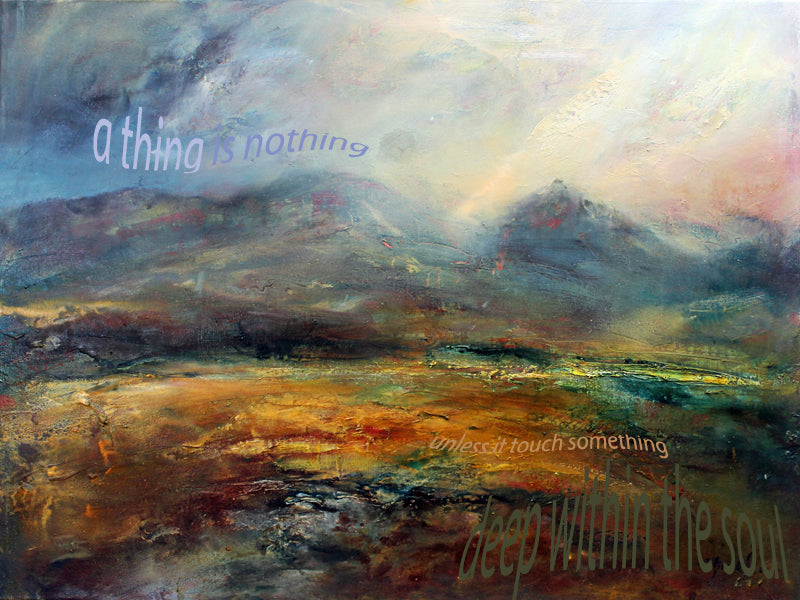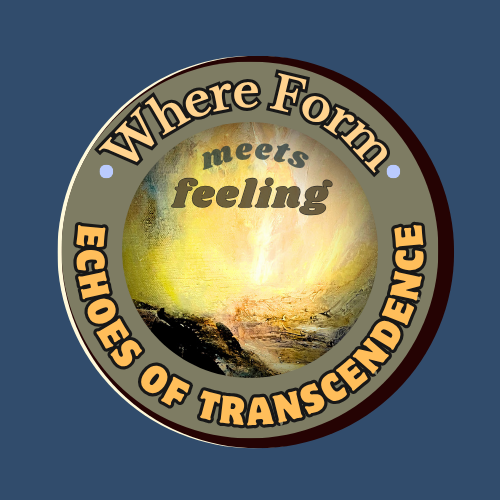
The Mystery of Transcendence
Share
Transcendental mystery isn't spoken about much in 'contemporary spirituality' circles. A lot is said about transformation, but very little about transcendence. The reason for this seems quite clear to me. As humans, our ego-centric lives are generally stuck in a world of doing. 'To transform' contains the seed of something needing to be done. Whereas transcendence is a happening. In other words, the first idea is primarily objective, whereas the second is subjective. One a thing to be worked at, the other a thing to be experienced - or rather the experience itself. The one requiring conscious effort - the other letting go. For me the interplay of these two vastly different elements form the basis of experience - both in terms of my life as a human being and in terms of my art.
Neither quality could be deemed 'better' than the other. They are just different. One has everything to do with the world of humanity and how we relate to it. The other is exclusive to what we might call 'otherness' - a spiritual experience. Ultimately what remains once we resign ourselves to death. And yet the experience of transcendence is a place where we can feel at home - any time we choose. Providing we're willing to accept reality exactly as it is in the moment. And therein lies the rub.
As humans we tend to kick against every obstacle that comes into our path. Why? Because it's not something we've planned, therefore we don't like it. It's in the way. If feels 'wrong' to be there. Some part of us rises against it, the part that wants to control the world around us. It becomes like a cancer that must be eradicated. Or like Hitler saw the Jews, Gypsies, and Jehovah's Witnesses. It's not a part of us - but separate and distinctly different. It must be gotten rid of! Or at the very least - it requires modification or change.
Therefore the tendency is to try to transform the world and ourselves, through manipulation, into something more acceptable. Applying the 'hands' to what we have in mind. And in reality this is how things get done. Transformation is driven by desire for change - for things to be different. Depending on our initial perception, transformative elements can be of intrinsic benefit to all - or not. It's not about motive. Our motive can be quite innocent. Adolf Hitler's motives were unquestionably highly charged toward excellence - looking toward idyllic transformation. However, his mistaken perception did not allow him to see that human beings are essentially all the same - one world, one heart. And that what he did unto others , he effectively did to himself. Similarly our own motives can be as as pure as the driven snow. And yet how often can our perception be mistaken? I believe the greatest mistakes we ever make are in the way we perceive.
Transcendence is cognizant with neither perception nor transformation. Transcendence has nothing to do with ideals. The mystery of transcendence is something that happens when we let go of all idealism. Letting go of everything we've been holding onto. Releasing our tight grip on personal salvation - the urge to feel both safe and justified. The grip that is powered by the ever-wanting, dissatisfied idealizing mind. And strengthened by fear of all kinds of negative possibilities. Transcendence laughs in the face of all striving, and smiles quietly at the futility of every endeavor.
In some profound way the interplay of these two natural universal elements form the basis of all human progress - probably of evolution itself. Transformation goes out from consciousness to achieve some positive effect. Transcendence happens when something 'beyond' takes over. Transformation can be qualified, quantified and talked about with enthusiasm. Whereas transcendence is a quality of 'the unspeakable mystery' of Life with a capital L. Thus we find ourselves in an ongoing creative world of magical mystical interplay - the juxtaposition of shadows and light. The objectivity of transformation, by its very nature casting its own shadow across the pure formless transcendental mystery of Light.
